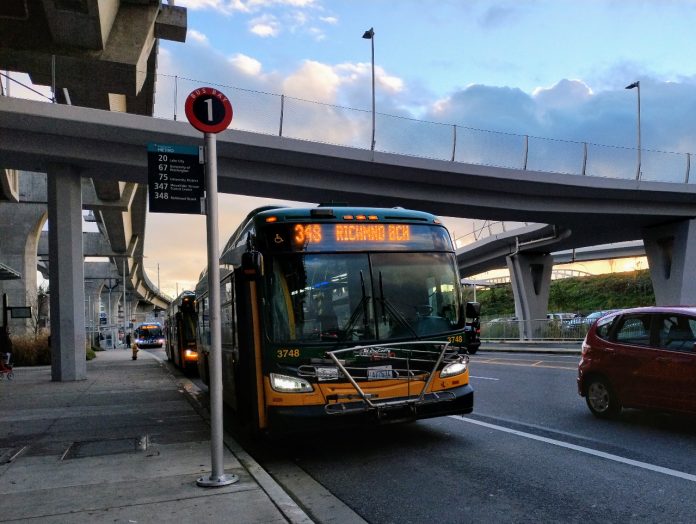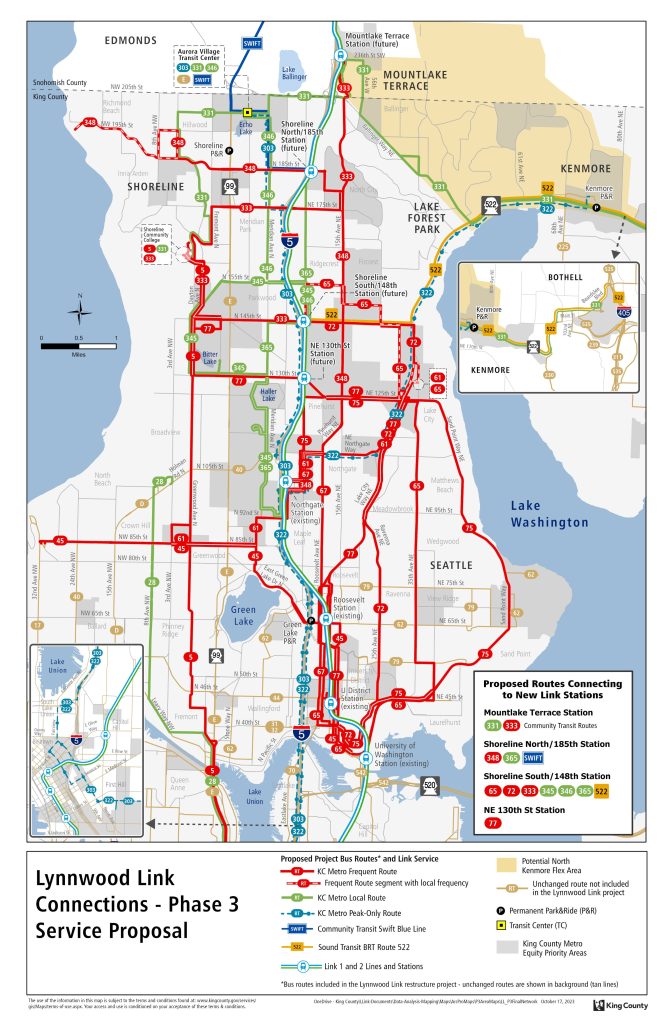
Expanded evening and weekend transit will be the biggest gain in the bus restructure. Routes 20 and 73 will be among the biggest losses.
King County Metro has released its final bus restructure plan to support Sound Transit’s Lynnwood Link Extension opening this fall. Most of the plan remains the same as The Urbanist reported last fall, but Metro has revealed it is planning to roll out the changes in three phases. Along with some brand new routes, a few routes will be getting the axed with no replacement service for the corridor. However, on net, Metro is touting the plan as an improvement for riders.
The plan will allow for some service growth buoyed by the restoration of 132,000 annual service hours and an additional 17,500 annual service hours supported by the City of Seattle. Within the service area, Metro estimates that weekday trips will increase by 9% and weekend trips will jump by 32%, allowing span of service to improve along with higher frequency on four existing routes. Evening service after 10:00pm will see a noticeable improvement with 43% more trips.
On top of this, riders will see improved east-west connections with three brand new east-west routes and enhancement to three existing ones. Better cross-town service has been a long-time request of riders, but some routes will require a transfer to complete a full east-west journey, so they’re not necessarily without a time penalty.
Some highlights from the plan
The new Route 77 will be a notable improvement over existing service for many Lake City riders. That’s because it will offer more local stops and directly connect those riders with two nearby light rail stations at NE 130th St and Roosevelt. Earlier in the restructure process, Metro had contemplated largely abandoning that service.
Another bright spot will be service in Shoreline. Most corridors will see retained service and some corridors will see new service. Metro is bringing on more frequency and span of service to many of the routes, making the bus network a more obvious choice for riders in suburbia. Doing so could help connect many of those riders directly to light rail without ever stepping into a car to do it, and it could encourage more local transit service use.
To further improve the plan, Metro added back local service to parts of the Meridian Avenue N in Shoreline, a corridor the agency had originally planned to abandon. Route 346 will, as a result, carry riders from Aurora Village Transit Center to Shoreline South/148th station, covering part of express Route 303’s corridor and Swift Blue Line — the latter of which will make no local stops.
On the flip side, Metro has stuck by plans to abandon two key corridors. With the retirement of Route 73, 15th Avenue NE from Lake City Way NE to Pinehurst Way NE will host no service, affecting portions of Maple Leaf, Victory Heights, and Northgate. Route 20’s corridor in Green Lake, Tangletown, and Wallingford, which acts as a neighborhood connector and shuttles riders to U District Station, will also be eliminated. The agency isn’t planning to offer any compensatory coverage strategy for these massive service losses, such as Metro Flex, even though buses and streetcars have operated on much of the latter’s corridor for over a century. Eliminating these corridors contravenes the County’s own long-range plan.
The plan will be rolled out in phases
The three phases of the plan are expected to happen as follows: Phase 1 will roll out this fall, Phase 2 sometime in 2025, and Phase 3 in 2026.
Phase 1 will deliver most of the changes. In it, Metro will add Routes 61, 333, and 365 as new routes while it will retire Routes 16, 20, 64, 73, 301, 302, 304, 320, 330, and 347, and revise Routes 28, 65, 303, 322, 331, 345, 346, and 348. Along with this, Routes 45, 75, and 372 will be retained, a new Metro Flex service will be deployed, and Route 65 will be extended to Shoreline South/148th station while Route 331 is extended to Mountlake Terrace station but not Bothell.
Phase 2 will bring on most of the remaining changes with Route 372 being retired, new Routes 72 and 77 being added, and Route 77 partially launching with service between Lake City and the U District. Additionally, Routes 45 and 75 will see their alignments changed and service levels improved, Route 65 will be slightly adjusted, and Route 331 will be extended to the University of Washington-Bothell campus.
Finally, Phase 3 will encompass just one small change: extension of Route 77 to Bitter Lake, thereby serving the NE 130th St light rail station opening in 2026.
However, a transmittal letter to the King County Council did note that implementation of the plan may look a little different from the outlined phases. “Notably, due to current workforce and vehicle maintenance constraints, Metro may need to implement a reduced version of the proposed network and grow service over time contingent upon operational capacity,” the letter reads. So the phases may be better seen as service implementation goals rather than absolutes.
Service characteristics embodied in the plan
In broad strokes, the final plan — when fully realized — will shake out as follows:
| Route | Routing Changes | Frequency | Span of Service |
|---|---|---|---|
| 5 | None | Weekdays: 15 minutes, except 20 minutes in evening and 30 minutes at night Saturdays: 20 minutes, except 30 minutes in evening and at night Sundays: 30 minutes | All days: 4:30am to 1:00am |
| 28 | Cut back to Broadview | Weekdays: 30 minutes, except 15 minutes at peak Weekends: 30 minutes | Weekdays: 5:00am to 12:00am Weekends: 6:00am to 12:00am |
| 45 | Adjusted to terminate on its southern end at University of Washington station and operate on NE Pacific Street instead of via the University of Washington campus | Weekdays: 15 minutes, except 12 to 15 minutes at peak and 30 minutes at night Weekends: 15 minutes, except 30 minutes at night | Weekdays: 5:00am to 1:00am Weekends: 5:15am to 1:00am |
| 61 | Runs between Greenwood and Lake City via Northgate, partially replacing Route 20 | All days: 15 minutes, except 30 minutes at night | All days: 5:30am to 1:30am |
| 65 | Route 65 will be partially adjusted to serve Shoreline South/148th station though service north of Lake City will run less frequently, and partially replaces Route 330 | Weekdays: 15 minutes, except 20 minutes at night Weekends: 15 to 30 minutes, except 30 to 60 minutes at night | All days: 5:00am to 2:00am |
| 67 | None | Weekdays: 15 minutes, except 20 minutes at night Weekends: 15 to 30 minutes, except 30 to 60 minutes at night | All days: 5:00am to 2:00am |
| 72 | Replaces southern part of Route 372 and extends service to Shoreline South/148th station | Weekdays: 10 minutes, except 15 minutes in evening and 30 minutes at night Weekends: 15 minutes, except 30 minutes at night | Weekdays: 4:30am to 1:00am Weekends: 5:30am to 1:00am |
| 75 | Adjusted to operate on 15th Avenue NE instead of University Way NE and terminate at U District station | Weekdays: 15 minutes, except 30 minutes at night Weekends: 15 to 20 minutes, except 30 minutes at night | Weekdays: 5:00am to 1:00am Weekends: 5:30am to 1:00am |
| 77 | Replaces southern part of Route 522 and extends service to NE 130th St station, Bitter Lake, and U District station | Weekdays: 15 minutes, except 30 minutes at night Weekends: 15 to 20 minutes, except 30 at night | Weekdays: 5:00am to 1:00am Weekends: 5:30am to 1:00am |
| 303 | Adjusted to be routed through South Lake Union | Weekdays: 30 minutes at peak | Weekdays: 5:30am to 9:00am, 3:50pm to 7:00pm |
| 322 | Adjusted to go express via Northgate station instead Roosevelt station and routed through South Lake Union, and replaces Routes 302 and 320 | Weekdays: 30 minutes at peak | Weekdays: 5:45am to 8:45am, 4:00pm to 7:00pm |
| 331 | Adjusted to serve Mountlake Terrace station and extended to University of Washington-Bothell, and replaces Routes 302 and 372 | Weekdays: 30 minutes, except 20 minutes at peak and 60 minutes at night Weekends: 30 minutes, except 60 minutes at night | Weekdays: 5:30am to 12:00am Weekends: 6:30am to 11:00pm |
| 333 | New route between Mountlake Terrace sand Shoreline South/148th stations via Richmond Highlands and Parkwood, and replaces Routes 301, 304, 330, and 347 | All days: 15 minutes, except 30 minutes in evening and at night | All days: 5:30am to 12:00am |
| 345 | Extended to serve Shoreline South/148th station and replaces Route 330 | Weekdays: 30 minutes, except 20 minutes at peak Weekends: 30 minutes, except 60 minutes in evening and at night | Weekdays: 5:00am to 11:30pm Weekends: 6:00am to 11:30pm |
| 346 | Southern end shortened to terminate at Shoreline South/148th station | Weekdays: 30 minutes, except 60 minutes at night Weekends: 30 minutes, except 60 minutes in evening and at night | All days: 6:00am to 11:30pm |
| 348 | Adjusted in some parts of Shoreline with the Richmond Beach tail running less frequently, and replaces Routes 73, 302, 303, and 347 | Weekdays: 30 minutes, except 15 minutes at peak Weekends: 30 minutes | All days: 5:30am to 12:00am |
| 365 | New route running between Shoreline North/185th and Northgate stations via Shoreline South/148th station and Haller Lake, and replaces Routes 346 and 347 | Weekdays: 30 minutes, except 20 minutes at peak Weekends: 30 minutes, except 60 minutes in evening and at night | Weekdays: 5:00am to 11:30pm Weekends: 6:00am to 11:30pm |
| 522 | No changes in 2024, but once the Link 2 Line fully opens in 2025 the route will be adjusted to serve Shoreline South/148th station via NE 145th Street instead of Roosevelt station | All days: 15 minutes, except 30 minutes at night | Weekdays: 4:30am to 12:30am Weekends: 5:00am to 12:00am |
| Metro Flex | New Metro Flex service will be deployed to portions of Lake Forest Park, Kenmore, and Mountlake Terrace | Weekdays: on demand | Weekdays: 7:00am to 7:00pm |
The King County Council will have final say on the plan, but the body rarely makes many substantive changes to Metro plans — even if the plans leave some riders out to dry in a few corridors. Once the plan is approved by the council, it will start to be implemented later this year as part of the fall service change on August 31. That will coincide with the bus restructure around the RapidRide G Line and perhaps just ahead of the actual grand opening of the Lynnwood Link Extension.
Stephen is a professional urban planner in Puget Sound with a passion for sustainable, livable, and diverse cities. He is especially interested in how policies, regulations, and programs can promote positive outcomes for communities. With stints in great cities like Bellingham and Cork, Stephen currently lives in Seattle. He primarily covers land use and transportation issues and has been with The Urbanist since 2014.



